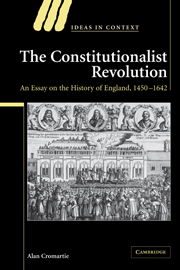Book contents
- Frontmatter
- Contents
- Acknowledgements
- Introduction
- 1 Fortescue's world
- 2 St German's world
- 3 Reformation and the body politic
- 4 Commonwealth and common law
- 5 Puritans and Anglicans
- 6 James, kingship, and religion
- 7 Law, politics, and Sir Edward Coke
- 8 The constitutionalist revolution
- Epilogue: the constitutionalism of John Locke
- Bibliography
- Index
- IDEAS IN CONTEXT
3 - Reformation and the body politic
Published online by Cambridge University Press: 10 December 2009
- Frontmatter
- Contents
- Acknowledgements
- Introduction
- 1 Fortescue's world
- 2 St German's world
- 3 Reformation and the body politic
- 4 Commonwealth and common law
- 5 Puritans and Anglicans
- 6 James, kingship, and religion
- 7 Law, politics, and Sir Edward Coke
- 8 The constitutionalist revolution
- Epilogue: the constitutionalism of John Locke
- Bibliography
- Index
- IDEAS IN CONTEXT
Summary
The sharp-eyed Venetian who visited in 1497 thought that the English people had ‘various opinions concerning religion’. He had probably heard of the Lollards, but otherwise we do not know precisely what he meant; we can be sure, however, that if variety is a sign of vigour, English religious culture was extremely vigorous, not least because its intellectual leaders showed some capacity for self-criticism. The Standish affair was an excellent example: Standish was a Franciscan with a friar's indifference to merely institutional privileges, while the leader of his critics, the abbot of Winchcombe, was not a comical reactionary, but a reformer of another type, ‘the most distinguished English monk’ of the early Tudor period. It was entirely fitting that a serious-minded monk should favour the reception of the canons of the recent Lateran council.
In the first part of the reign of Henry VIII, an obvious feature of this lively scene was the support of church and state for humanist endeavours. William Warham, the archbishop of Canterbury, was a significant patron of Erasmus, as was Richard Fox, the bishop of Winchester, who may for a time have been Henry VII's most influential servant. In his retirement from politics, Fox was also the founder of Corpus Christi, Oxford, a college he provided with a lecturer in Greek. Henry VII's widow, Margaret Beaufort, set up two Cambridge colleges in close association with John Fisher, while Wolsey went out of his way to attract the great Spanish humanist Juan Luis Vives to England.
- Type
- Chapter
- Information
- The Constitutionalist RevolutionAn Essay on the History of England, 1450–1642, pp. 59 - 79Publisher: Cambridge University PressPrint publication year: 2006



